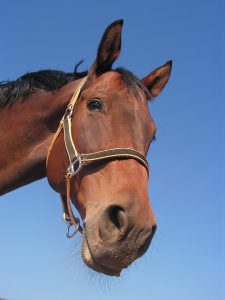By NewsDesk @infectiousdiseasenews
North Carolina agriculture officials reported the first case of Eastern Equine Encephalitis (EEE) of the year in the state in a four-year-old, unvaccinated mare in Cumberland County. The horse was euthanized.

EEE causes inflammation or swelling of the brain and spinal cord and is usually fatal. Symptoms include impaired vision, aimless wandering, head pressing, circling, inability to swallow, irregular staggering gait, paralysis, convulsions and death. Once a horse has been bitten by an infected mosquito, it may take three to 10 days for signs of the disease to appear.
“If your horses exhibit any symptoms of EEE, contact your veterinarian immediately,” said State Veterinarian Doug Meckes. “it is imperative that horse owners keep their vaccines current, talk to your veterinarian about vaccinating them as soon as possible against EEE and West Nile virus.”
The vaccinations initially require two shots, 30 days apart, for horses, mules and donkeys that have no prior vaccination history. Meckes recommends a booster shot every six months in North Carolina because of the state’s prolonged mosquito season.
Subscribe to Outbreak News TV on YouTube
Mosquitoes can breed in any puddle that lasts for more than four days, so removing any source of standing water can reduce the chance of exposing animals to WNV or EEE. Keeping horses in stalls at night, using insect screens and fans and turning off lights after dusk can also help reduce exposure to mosquitoes. Insect repellants can be effective if used according to manufacturers’ instructions.
Naegleria infection linked to Fantasy Lake Water Park in Cumberland County, NC
North Carolina veterinarian warns about Asian longhorned ticks
North Carolina officials investigate Legionnaires’ disease outbreak at Cherokee casino
North Carolina: Chickenpox outbreak reported at Asheville school

